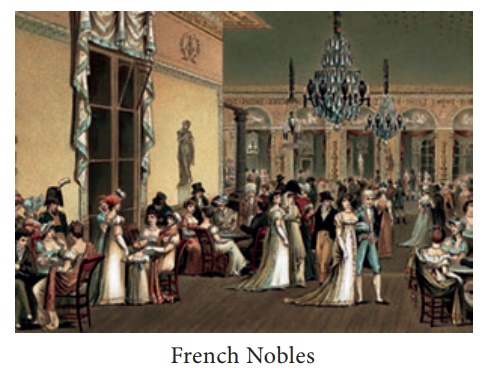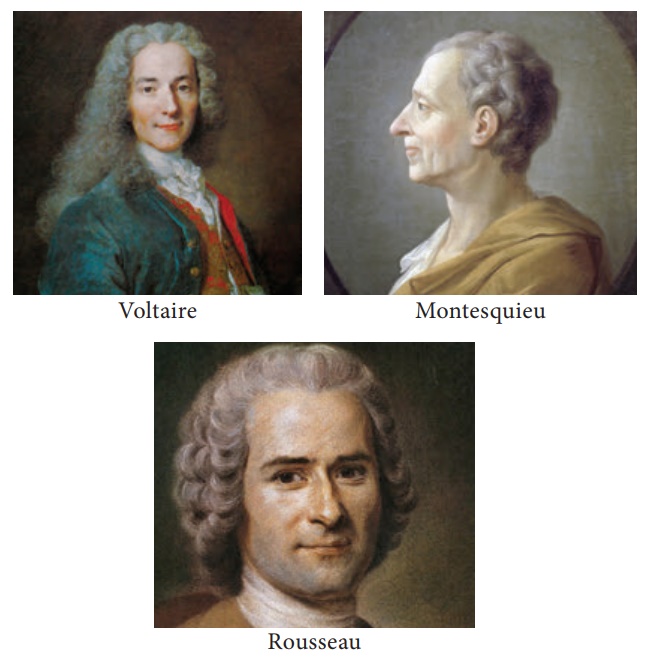The French Revolution | History - Causes of the Outbreak | 9th Social Science : History: The Age of Revolutions
Chapter: 9th Social Science : History: The Age of Revolutions
Causes of the Outbreak
Causes of the Outbreak
Political
Louis XV succeeded his great-grandfather Louis XIV and reigned for
fifty nine years. He learnt no lesson that the king is not above law but bound
by law from the English Revolution and the beheading of the King Charles I. In
1774 he was succeeded by his grandson Louis XVI. He was entirely under the
influence of his wife Marie Antoinette, who believed, more than the King, in
the Divine Right Theory of Kingship - the theory that the king was
representative of god on earth and therefore for all his actions he was accountable
only to god and not to anybody else. Both the King and the Queen were hated by
the people.
Economic
On the eve of the French revolution France was going through a
period of economic crisis. The French treasury was bankrupt because of its
involvement in the Seven Years War that ended in defeat. French participation
in the American War of Independence made the financial condition worse. The
luxurious lifestyle of the royalty and nobles in Versailles court, in contrast
to the grinding poverty of the common people, made the people accept the new
ideologies of French philosophers of the eighteenth century. The Finance
Ministers of the King, Turgot, Necker, Calonne and Brienne one after the other
suggested reduction of royal expenditure and taxation of the first two Estates
- the nobles and the clergy. Their advice was not only disregarded but they
themselves were dismissed from service. To meet the resource crunch the
government borrowed heavily resulting in a huge fiscal deficit. Nearly half the
revenue went towards payment of interest for the loans. Under the
circumstances, the French monarch Louis XVI was forced to convene the Estate
General, the combined body of three estates comprising nobles, clergy and
commoners respectively.

Social
The condition of the already impoverished peasants worsened due to
a series of bad harvests. It resulted in the rise of the price of bread. The
peasants of the countryside and the labourers and artisans of the towns were
the worst affected. There were hunger riots at the beginning of the reign of
Louis XVI.![]()
They were followed later by fresh peasant risings. A vast number
of people had become professional beggars. It was officially declared in 1777
that there were eleven lakhs of beggars in France. The peasants were hungry not
only for food, but were also hungry for land. They hated the nobles and the
clergy because they enjoyed many privileges, notably exemption from taxation.
The clergy, despite being a minority, numbering only about 130,000, occupied a preeminent positionin France. They collected tithe (one tenth of the annual produce or earnings) from the common people. The nobility, also a minority, numbering about 110,000, was a landowning class enjoying feudal rights. They collected feudal dues from the peasants. Their land was tilled by the peasants. The farm produce of the peasants had to be processed in the mills of the feudal lord. The traditional hereditary nobles known as nobles of the sword enjoyed hunting rights. They were against the rising middle class (bourgeoisie) or a new class of nobility, the status that was conferred by the king for their services. These nobles were known as nobles of the robe.
The middle class and the peasants together formed the Third
Estate. The bourgeoisie (the capitalist class) were the privileged few but the
bulk of the Third Estate was constituted by the representatives of peasants.
The peasants paid taxes to the state such as taille (land tax), gabelle (salt
tax), etc., and provided free labour (corvee) for the construction of public
roads. Burdened by the demands of the state, nobility and clergy, the peasants
were in despair at the prospect of dying of starvation.
Inspiration from French Philosophers
There were many notable thinkers and writers in France in the
eighteenth century. The most famous writer of the time on rationalistic and
scientific subjects was Voltaire (1694-1778). When imprisoned and banished, he
had to live at Ferney near Geneva. Voltaire, Montesquieu (1689-1755) and
Rousseau criticized the then existing conditions in France. Voltaire, was a
prolific writer and activist, and was vehement in his criticism of the Church.
His most famous work was Candide. His famous quote was: “those who can make you
believe absurdities can make you commit atrocities.” He is said to have once
exclaimed, “I disapprove of what you say, but I will defend to the death your
right to say it.”
Another great writer, a contemporary of Voltaire, but younger than
him, was Jean Jacques Rousseau (1712-78). His political theory set the minds of
many afire with new ideas and new resolves. His ideas played an important part
in preparing the people of France for the great revolution. He famously said in
his book Social Contract, “Man is born free, but is everywhere in chains.” He
argued that the laws are binding only when they are supported by the general
will of the people.
Montesquieu (1689-1755), who wrote The Persian Letters and The
Spirit of the Laws, also defended liberty. He put forward the theory of
separation of powers: The liberty of the individual would be best protected
only in a government where the powers of its three organs, viz., legislature,
executive and judiciary were separate. It would put in place the necessary
checks and balances to prevent any one organ from assuming more power to
itself.![]()
An Encyclopaedia also came out in Paris about this time and this
was full of articles by Diderot and Jean d’Alembert. These philosophers and
thinkers, opposed to religious intolerance and political and social privileges,
succeeded in provoking large numbers of ordinary people to think and act.

American War of Independence
The American Revolution that broke out in 1776 and ended with the
establishment of the American Republic inspired the French Revolution and
provided them with a model. The French participation in the American War of
Independence supporting the American cause against the British directly
affected the French Revolution in two ways: one, it cost the French treasury
heavily and the other, the French like Lafayette who participated in the
American War of Independence came back with democratic ideals and played an
active role in the French Revolution.
Related Topics